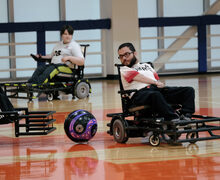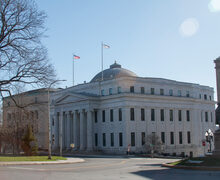Syracuse University professors show political slant through campaign donations
Daily Orange File Photo
Faculty, staff and administrators at Syracuse University have donated far more frequently to Democrats than Republicans over the last four election cycles.
During the 2008 election cycle, just two Syracuse University faculty, staff or administrators donated to Republican presidential nominee John McCain’s campaign. Forty-two donated to the campaign of Democratic nominee Barack Obama.
That election was the clearest example of a long-term pattern at the university: Faculty, staff and administrators have donated overwhelmingly more often to Democratic politicians rather than Republican politicians over the last four election cycles, a review of Federal Election Commission data revealed.
It reflects a national trend, one in which the number of liberals in academia far outweighs the number of conservatives. Across the country, liberal faculty outnumber their conservative colleagues by about five to one, according to data compiled by UCLA’s Higher Education Research Institute.
Experts who study the phenomenon have come to different conclusions about the degree to which it matters. Some say it has negative consequences in research and possibly influences learning in the classroom, while others have downplayed its importance.
At SU, more than nine times as many faculty, staff and administrators have contributed to Democrats compared to those who have contributed to Republicans over the past 14 years. Since 2003 — the oldest FEC data available — 247 faculty, staff and administrators have made individual federal political contributions to Democrats or committees supporting Democrats, excluding donations to joint fundraising committees. Meanwhile just 27 have donated primarily to Republicans or committees supporting Republican candidates in that time.
The left-leaning tendency has been consistent over each of the four major election cycles in that time, something experts said has been true across most college campuses.
Neil Gross, a professor of sociology at Colby College, said that trend is likely more a result of self-selection into academia than it is discrimination against conservatives in hiring practices.
“If you look at students who aspire to be professors, really right from the beginning of college, they tend to be much more left-leaning. If you look at graduate students, those people getting their Ph.D.s tend to be much more left-leaning,” he said. “It seems to be the case that if you have a more progressive orientation, you’re more likely to want to go into higher education.”
He added that, in his own research, he’s found that in most fields, professors are able to keep their politics out of the classroom.
But even if that’s true, conservative critics said it’s still likely that the lack of conservatives among faculty has consequences in research. That’s particularly true in many areas in the social sciences and humanities, said Gerard Alexander, an associate professor of political science at the University of Virginia.
“In those areas, it would be kind of odd for the researchers’ values not to inform what they do, if only in the sense that people’s values help inform what they think is important, what they think is worth learning about,” he said. “That affects not only how we greet research we see and the materials we teach, but it also affects the materials we might be inspired to teach to begin with.”
In turn, that can result in lost research in important areas, experts said. For example, several experts said sociologists in academia minimized the importance of two-parent households for decades. It wasn’t until the mid-1990s that they “started admitting what was obvious” — that family structure matters for children — said Joshua Dunn, a professor of political science at the University of Colorado, Colorado Springs.
Conservative faculty often won’t bring up research ideas because they’ll fear not getting tenure, or their ideas will simply get ignored by their colleagues, said Robert Maranto, the endowed chair in leadership at the University of Arkansas’ College of Education and Health Professions.
“It’s really been disastrous for academia, because it’s limited our ability to tackle ideas and problems,” Maranto said. “It’s limited our ability to ask good questions. It’s made us too smug.”
“There are entire researcher areas that just don’t exist because they just don’t conform to what a lot of liberal progressives and scholars think is important or think should be important,” Alexander added. “Almost every conservative or libertarian scholar, I promise you, could point to a few areas in which they find something very interesting but can’t convince the majority of people in academia to care about it.”
In addition, there’s at least some research that suggests the liberal climate of college campuses can find its way into the classroom. A 2014 survey conducted at the University of Colorado found that Republican students were more likely to feel intimidated sharing their beliefs in class.
“You have to suspect that some of that comes from the general center that’s established in some classes,” Dunn said.
Dunn also said, though, that “the evidence shows” most faculty are professionals and want to do their job without promoting their political beliefs.
Additionally, Gerard said those who criticize the trend of liberal academia aren’t advocating for there to be fewer liberals on campuses or saying there are too many left-wingers at universities.
“That isn’t all what this is about,” he said. “It’s just saying there’s a price to be paid when we have 50 percent of the American spectrum represented incredibly anemically in most campuses and most departments.”
Published on October 31, 2016 at 10:17 pm
Contact Michael: [email protected]




